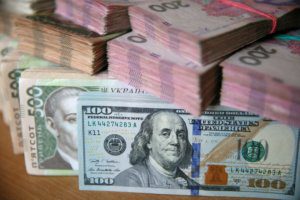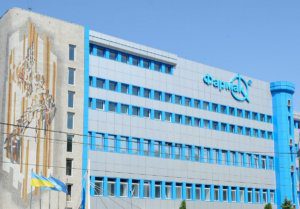
Money supply in Ukraine in August 2018 increased by 0.3%, to UAH 1.233 trillion, such preliminary data of monetary statistics are posted on the website of the National Bank of Ukraine (NBU).
The country’s monetary base expanded 0.3% last month, to UAH 421.89 billion.
The NBU said that off-bank cash in August shrank by 0.6%, to UAH 344.17 billion, while ending stock on deposits grew by 0.9%, to UAH 888.66 billion.
Since early 2018, money supply grew by 2% and monetary base – by 5.7%, while off-bank cash rose by 3.5%.

Comfy Trade LLC (Dnipro), the owner of a large household appliances and electronics store chain under the Comfy brand in Ukraine, has leased a warehouse with a total space of 21,000 square meters in Velyka Dymerka (Kyiv region) from Raben Ukraine.
Comfy warehouse director Maksym Yakymenko told Interfax-Ukraine that at the end of April 2018 the transfer of the central warehouse of Comfy from Dnipro to Velyka Dymerka was completed.
“The central warehouse of Comfy is located in Velyka Dymerka, Kyiv region. The company leased A+ class premises with an area of 21,000 square meters. Raben leases out the modern warehouse complexes,” he said.
Yakymenko said that it is not planned to locate the fulfillment center, which provides for the implementation of all operations from the moment of registering an online order until the receiving of the product by a client.
“We do not have plans to locate the fulfillment center at the central warehouse. Maybe, in the future we would consider this option,” he said.

Sweden’s IKEA, the largest furniture and household goods retailer in the world, has officially announced the opening of a first store in Ukraine in the city store format in the shopping and entertainment center Ocean Mall in 2019. “The company will open its first store of the new city format in Kyiv in 2019. It will be one of the first IKEA city stores in the world… along with France, the U.K., Denmark, the United States and China. The store in Kyiv will be located in the shopping and entertainment center Ocean Mall,” the press service of the company said.
According to the announcement, the new format of the stores is smaller in size and located in the central part of the city to satisfy the demands of modern consumers who want to make purchases closer to home, as well as online.
“Taking into account the results of the market and consumer preferences study, our team has chosen the most favorable business model, which will enable IKEA to implement plans in Kyiv in the near future. In the new store of the city format, our buyers will get acquainted with the new IKEA approach to creating a comfortable life for as more people as possible,” IKEA Southeast Europe CEO Stefan Vanoverbeke said.
As reported, the report of the Swedish retailer for 2017 says that the company is testing a new city store format, one with a smaller area and closer to the city.
As was announced earlier, IKEA plans to open stores with an area of up to 5,000 square meters in Warsaw’s Blue City shopping and entertainment mall (Poland) and in the center of Paris (France). They will stock a smaller assortment of goods, with emphasis shifted to online commerce services.
In December 2017, IKEA announced plans to open the first facility in Kyiv within two years.
According to the press service, the development of the network in Ukraine will be under the aegis of IKEA Southeast Europe, which is part of the IKEA Group (Ingka Holding B.V.). The company is engaged in retail business IKEA in Croatia, Serbia, Romania and Slovenia. Swedish IKEA is one of the world’s largest retail chains for furniture and household goods. The owners of the IKEA Group are Ingka Holding B.V. and structures under its control.

The insurance companies of Ukraine in January-June 2018 collected net premiums for the amount of UAH 16.747 billion, which is 24% more than for the same period a year earlier, according to the website of the National Commission for the State Regulation of Financial Services Markets.
According to the regulator, the volume of gross insurance premiums collected by insurers for the period was UAH 23.425 billion (10.4% more).
The commission notes that an increase in gross insurance premiums was recorded for almost all types of insurance: auto insurance (KASKO, OSAGO, Green Card) by UAH 937 million, or 18.6%, life insurance by UAH 487.7 million, or 39.2%, credit insurance by UAH 442.8 million, or three times more, insurance of liability to third parties by UAH 419.7 million, or by 37.1%, insurance against accidents by UAH 316 million, or by 61%, property insurance by UAH 285.3 million, or 10%, medical insurance by UAH 263.8 million, or by 18.7%, medical costs insurance by UAH 139.6 million, or 34.7%, insurance against fire risks and risks of natural phenomena by UAH 105 million, or 5.2%.
The share of net insurance premiums in gross insurance premiums for the first half of 2018 increased by 7.8 percentage points from the same indicator of 2017 and amounted to 71.5%.
In January-June this year insurers paid UAH 5.863 billion in net insurance claim fees, which is 27% more than for the same period a year earlier. The level of net payments increased to 35% from 34.2%.

PJSC Farmak (Kyiv), among top three leaders of the pharmaceutical sector of Ukraine, in 2018 plans to increase the exports share to 33%.
The company told Interfax-Ukraine that in H1 2018 Farmak’s exports grew by 13% year-over-year, in particular, thanks to supplies to Uzbekistan (a rise by 20%), Belarus (by 124%), Kazakhstan (by 13%) and Kyrgyzstan (by 16%).
Sales of products to Russia remained at the level of 2017.
“We want to increase the export potential of the company by retaining the leading positions in Ukraine. It would lead to an increase in production, creation of new jobs, an increase in the amount of taxes paid. For Farmak, the markets of the European Union and Asia remain a priority,” Farmak Executive Director Volodymyr Kostiuk said.
In general, according to him, in 2017, Farmak exported products for $70 million. In 2017, Poland, Uzbekistan and Russia dominated the structure of foreign sales. In particular, sales to Poland accounted for 28.3% of total exports, Uzbekistan – 20.9% and Russia – 16.7%.
In 2017, the share of Farmak’s sales in foreign markets was 31%.
Farmak is a member of the Association Manufacturers of Medications of Ukraine (AMMU).